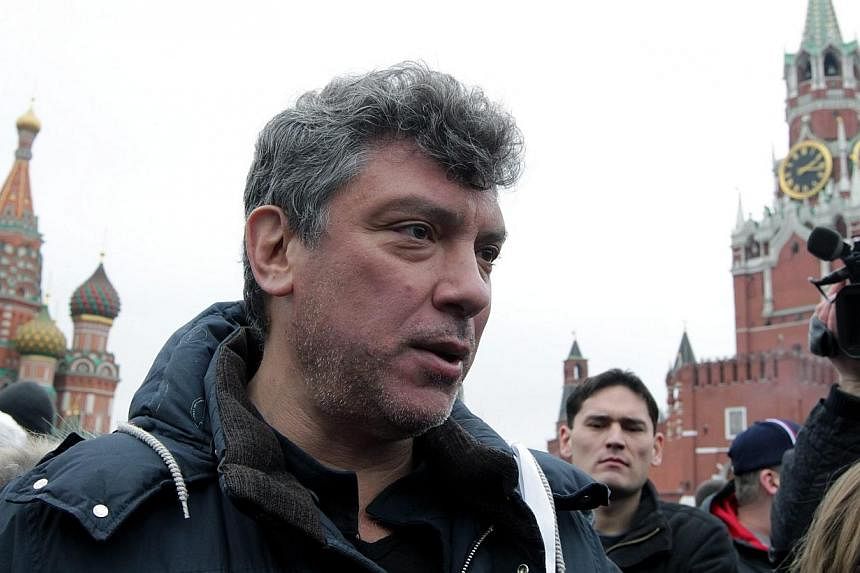MOSCOW (AFP) - Russian opposition leader Boris Nemtsov, gunned down on Friday in a contract-style killing, gave an interview this month admitting he had feared for his life over his opposition to President Vladimir Putin.
In an interview with weekly Sobesednik, Nemtsov was asked: "Have you started worrying that Putin could personally kill you in the near future or do it through middle men?"
He replied: "You know... yes. A little.
"But all the same I'm not that scared of him. If I was that afraid, I would hardly have headed an opposition party and would hardly be doing what I'm doing now," he said in the interview published in early February.
The Kremlin critic who courted public anger by opposing Russia's actions in Ukraine said he often discussed politics with his 86-year-old mother, Dina, who agreed with his views but feared he could suffer deadly consequences.
"She is categorically against what is happening in Ukraine, she thinks that it's a disaster and a complete nightmare," he said.
"But she is more worried about Putin than Ukraine. Every time I call her, she gives me a talking-to: 'When will you stop being rude about Putin? He'll kill you.' And she is being absolutely serious," Nemtsov said.
In a light-hearted exchange, the Sobesdenik journalist told Nemtsov: "I hope that common sense will prevail after all and Putin won't kill you."
"God willing. I hope so too," Nemtsov replied.
Investigators in charge of the probe into Nemtsov's killing cited threats to him over his condemnation of the murders at Charlie-Hebdo weekly as a possible motive.
Separately, the former prime minister of Lithuania, Conservative leader Andrius Kubilius, yesterday said Nemtsov had considered asylum in his country in 2012, saying he feared persecution by the Kremlin.
Kubilius said he had promised Nemtsov safe haven in Lithuania during a private conversation on the sidelines of his party's congress in 2012, but Nemtsov ultimately decided to stay in Russia.
"Nemtsov said he was feeling threatened that he could be arrested and put in jail" following the opposition's so-called "Bolotnaya" protests against Vladimir Putin's third presidential term in 2012, Kubilius told AFP on Saturday.
"He asked if Lithuania would provide political asylum. I told him to have no doubts about it and offered that he stay here, but finally he refused," said Kubilius, who lost general elections later in 2012.
Lithuania is among the most hawkish Nato and EU members on Russia, and has repeatedly called for tougher sanctions for Moscow's intervention in Ukraine.
President Dalia Grybauskaite said Saturday the murder showed that Russia was "sliding down to the darkness of terror against its own people".
Local activists will hold a march in the capital Vilnius in memory of Nemtsov on Sunday, in a show of solidarity with a planned opposition march in Moscow.

